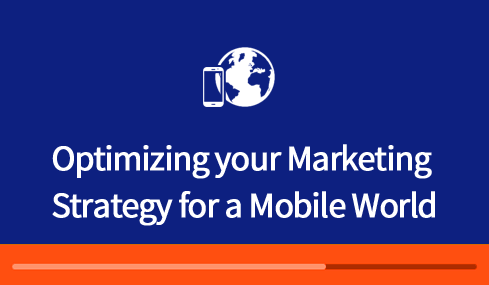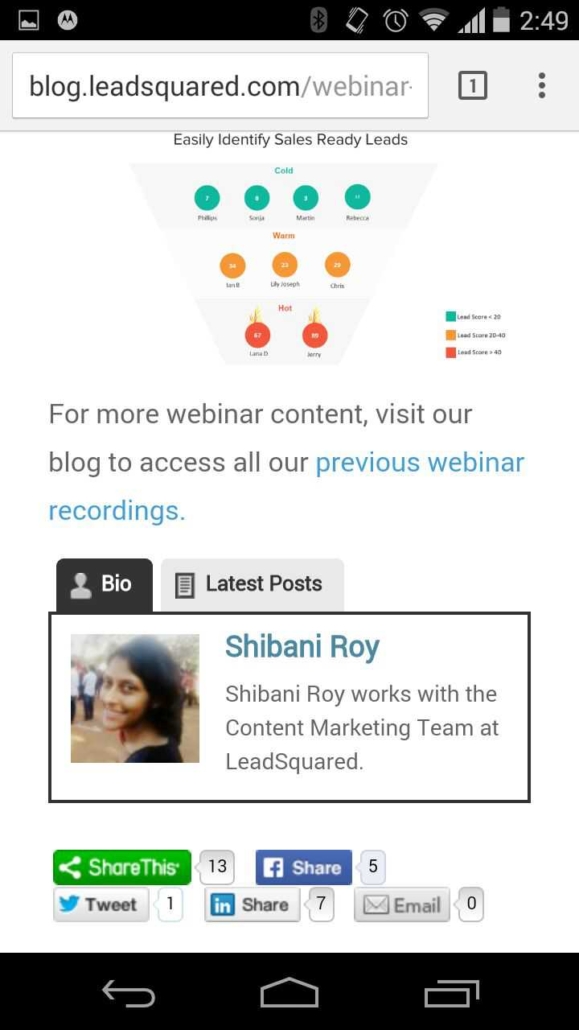The webinar on “Optimizing your Marketing Strategy for a Mobile World” conducted by Nilesh Patel and Meenu Joshi raised a number of interesting questions. The enthusiasm shown by the attendees is definitely encouraging. Those of you who missed it, here’s a summary of some of the questions asked during the webinar.

Question 1
For follow ups in our business, are mailers more effective than SMS? What do you recommend?
Both have a role to play. There’s obviously a lot of clutter in emails, but they are important. Marketers will continue to use emails, irrespective of whatever is said and done.
However, our customers have told us that they need the ability to reach their customers using SMS because they have found that emails (in the consumer category) may not be as useful. Another reason could be that mobiles are more accessible and are therefore, more useful for consumer markets.
Question 2
What do you you mean by responsive design?
It means design of your content (website, landing pages, emails etc.) should be optimized across devices – mobile, tablets and desktops.
 Question 3
Question 3
What does slim copy mean?
Slim refers to content that uses very few words to describe your business, the product or the benefit. If you look at some of the really old websites, it’s almost like they have written everything possible on those pages, typically in a small Arial font, making is highly unreadable. So those are history when it comes to mobile. Now, the content has to be short and crisp.
Question 4
What is RTB?
RTB is real-time bidding. It is not really an advertisement option. It is more of how you actually bid on your ads and this is more of dramatic buying. Basically there are so many devices available, so many people are using apps. So the advertisers will compete with each other real-time to place an ad and whoever bids the most, their ad will be placed. A simple comparison would be the stock exchange where you buy and sell shares. The one who actually bids the most will be able to buy the shares.
Question 5
In the ad format, what are incentivized ads and how does it work?
If you play games on mobile, sometimes they show an ad or they give you an option to buy some currency or some equipment for the game or even an incentive. Those are incentivized ads and they work as incentives.
Question 6
Which mobile ad format would you recommend for healthcare industry?
I would recommend three ad formats:
1. Banner Ads – The most inventory available is in the banner ad category. That would be the starting point for your campaigns.
2. Video Ads – Video ads have shown a very high growth in recent days and it is because of the engagement it offers.
3. Interstitial Ads – They are full page ads. Let me give you an example. If you use Flipboard and if you flip the pages, suddenly a full page ad appears and sometimes there are very high quality images used. Such ads will have a very high impact on the user.
Question 7
How effective is Google+ for mobile search?
Google + is effective for search anyway because the hashtags that you use on Google Plus are searchable on Google and that remains the same for mobile as well. If your business is a local business, for instance a restaurant or any other business where the location is important to you, then you should look at optimizing your Google Local page because those are the listings that appear on top on your desktop and your mobile phone. In mobile, if your phone numbers are listed properly in your local pages, then click-to-call would become available.
 For more inputs on how Google Plus can help your business, take a look at these:
For more inputs on how Google Plus can help your business, take a look at these:
1. Google Plus Guide for Marketers
2. 11 Google Plus Best Practices for Businesses
3. What and Why of Google Plus for Businesses
Question 8
I have seen that when I search for relevant keywords, certain websites rank 1-2 on desktop but the result is not the same on mobile because it is not responsive. Is this because the website is not optimized on mobile?
That is definitely a reason. On web, if a person searches for a keyword, clicks on a link, and bounces off, and this happens repeatedly (when the search-bounce is happening for different users), then the website is pushed down on account of bad user experience. Similar thing happens in smartphones as well. You search for something on your phone, go to a website, and then bounce off (because the website is not responsive and difficult to browse). Many users do this and the rankings are bound to go down.
Google has made it clear that responsiveness or mobile-friendly of the website will be important for them from a search perspective. It is likely that if your website is not coming higher on search results on your mobile, it is the impact of your site not being responsive.
Question 9
Should we drop some images or boxes, social share icons and search boxes or take them to extreme bottom in mobile web vs. desktop?
We have actually struggled with this ourselves. We have a share bar on our blog and one of our customers actually pointed out that it is not rendering properly on the blog. We figured out a way to fix it. We optimized it for mobile. We optimized it in such a manner that it goes down if the content is viewed on mobile.

If you are using WordPress, you would be using a plugin for the share bar. In that case, look for the option to optimize it on mobile.
Question 10
Should we use PageSpeed Insights of WMT or is there a better tool for checking mobile site quality?
Google’s PageSpeed Insights gives you pretty good insights on how good your website is on both, desktop and mobile so I think you could continue using that.
Question 11
When we are developing a responsive website – are WordPress based sites effective?
Effectiveness of the website depends on multiple things but WordPress is a great platform to use. You will be able to buy a lot of themes which are relatively cheap and are responsive as well.
Question 12
Is there any software to check if emails are opening accurately on all the devices?
Emails will open irrespective of device, whether it will be read properly or not is the question. And that is a function of whether the email is responsive or not. You can always send test emails to yourself on Gmail, and check them through your phone. We generally test emails across devices before we send them out to our subscribers.
Question 13
Should we approach VAS companies for mobile ads?
I’m not sure about this. The access to mobile in a structured way is available with mobile line networks. When we talk about VAS players, I’m sure they’ll have the access to phone numbers. But if they are doing that, they are putting us in the category of promotional SMS list and I’m sure that is similar to unsolicited emails which we are not a big proponent of.
Question 14
Could you tell me a little bit about click-to-call?
If you search for something on maps or Google.com in a business, you will see a click-to-call button there, click and the call happens. So that call is happening from your mobile. On click-to-call, you basically have the ability to use your mobile number and receive a call from the other party. These are the two technologies available with click-to-call.
Question 15
Will paid ads like the ones on Facebook work better than organic SEO?
Facebook paid ads have their own place and they are certainly effective and useful. You would have noticed that Facebook’s ad revenue has gone up so I’m sure businesses are taking advantage of it and it is helping them grow. It definitely offers a value.
Both, Facebook ads and organic traffic have their advantages. A good marketing strategy would encompass both strategies. You should have an organic strategy in place along with paid ads. Try both and see what works out best for you.

Here are two E-Books on Facebook ads that you can look at:
1. Step-by-Step Guide to Generate Leads with Facebook Ads
2. Laser Target your Audience with Facebook Custom and Lookalike Audience
Question 16
Which one is preferred, Google AdWords or Facebook for paid ads?
Both are effective depending on the industry and your audience. You should invest on both and check the results.
Question 17
Please share some insights on mobile SEO.
I think as far as SEO is concerned, responsiveness of the website is fundamental. As long as you have taken care of that, most of the other elements are likely to be in the same category as other SEO things which you already know of.
If you have more questions, feel free to ask them below in the “Comment” section and we will get back to you on that. You could also check out our previous webinars here.






 Question 3
Question 3


